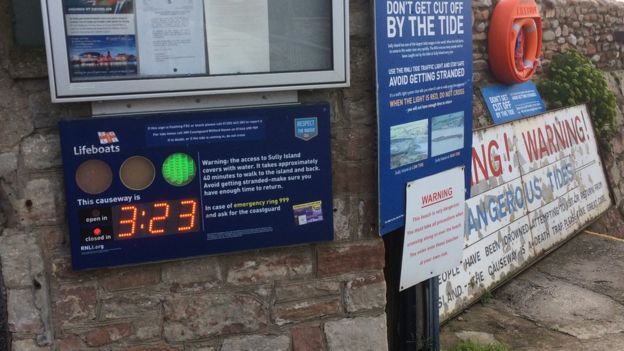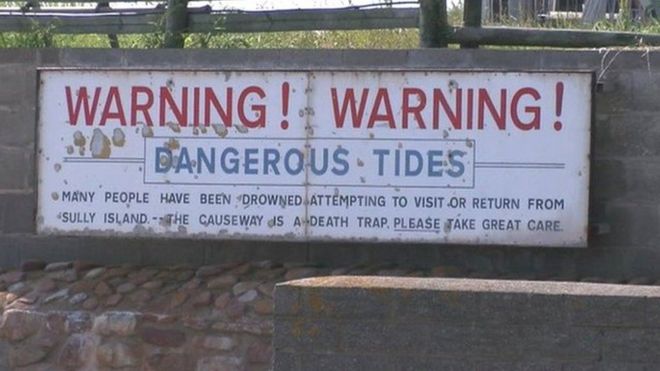As I write this, there are two gas engineers busy digging a hole in the road outside the Tavern. One of them has just lit a cigarette so, if this post is never completed, you will know why...
Remember Sully Island?
The 400m rocky causeway which connects this tiny outcrop to the coast of south Wales is completely covered by fast-flowing water twice a day. Back in 2014, the RNLI installed warning lights in a bid to reduce the number of visitors cut off by the rising tide.
(BBC news)
At the time, there was a suggestion that additional measures would be needed - audible warnings, perhaps, or text messages; this does not appear to have happened, although a new warning sign was put up earlier this year to supplement the pleasingly dramatic admonition below.
So, three years on, is the system working?
Sadly for humanity (or fortunately for the gene pool, depending on your outlook), such ignorance appears to be far from uncommon, as a trawl through the pages of this blog will show. In addition - and possibly a significant factor at Sully Island - there are the latter-day Cnuts, who somehow believe themselves (and their hapless families) exempt from the laws of nature and regard a tide-lapped causeway as a challenge.
As we have seen on previous excursions to the Somerset coast, the Bristol Channel claims to have the second strongest tides in the world (though some Canadians and Australians might beg to differ). Add in a 40-minute round trip on a slippery rock causeway and a plentiful supply of tourists - either ignorant or foolhardy - and you have a recipe for disaster.
Update: from the RNLI website: and still it goes on...
Remember Sully Island?
The 400m rocky causeway which connects this tiny outcrop to the coast of south Wales is completely covered by fast-flowing water twice a day. Back in 2014, the RNLI installed warning lights in a bid to reduce the number of visitors cut off by the rising tide.
(BBC news)
At the time, there was a suggestion that additional measures would be needed - audible warnings, perhaps, or text messages; this does not appear to have happened, although a new warning sign was put up earlier this year to supplement the pleasingly dramatic admonition below.
So, three years on, is the system working?
Thirty people have been rescued near Sully Island so far this year.Well I'd say that's a resounding 'no' - either that or there are even more potential Darwin Award winners out there than I thought. The RNLI and coastguard clearly have their work cut out - and they're not the only ones:
Gordon Hadfield, who owns the beach at Swanbridge and a cafe, said he and his staff had saved six people from the water in the past four years. Three weeks ago he led a family of eight to safety.So how do people manage to get themselves marooned or washed off the causeway with such depressing regularity? According to the coastguard service
"The sad fact is, a lot of people come down here and do not know the tide is going to come around them. They don't know it's an island, so there's a lot of education around that."Now, here I have to hold my hands up and say I have never been there but a quick look at Google clearly shows that, at low tide, the island's crown of vegetation is surrounded on all sides by sea-washed sand and rock; you don't have to be a geographical genius to work out the implications - unless, of course, you have no understanding of the concept of tides.
Sadly for humanity (or fortunately for the gene pool, depending on your outlook), such ignorance appears to be far from uncommon, as a trawl through the pages of this blog will show. In addition - and possibly a significant factor at Sully Island - there are the latter-day Cnuts, who somehow believe themselves (and their hapless families) exempt from the laws of nature and regard a tide-lapped causeway as a challenge.
As we have seen on previous excursions to the Somerset coast, the Bristol Channel claims to have the second strongest tides in the world (though some Canadians and Australians might beg to differ). Add in a 40-minute round trip on a slippery rock causeway and a plentiful supply of tourists - either ignorant or foolhardy - and you have a recipe for disaster.
---------------------
Update: from the RNLI website: and still it goes on...
'We were called just after 8:15pm this evening, Sunday 27th August 2017 to attend reports of people in the water off Sully Island.
When we arrived on scene the people who had been in the water had made it ashore but a further 4 people (3 adults, one child) required lifeboat assistance to return to the mainland.'



